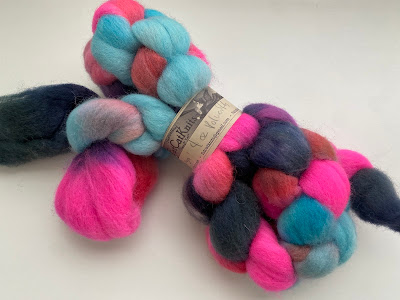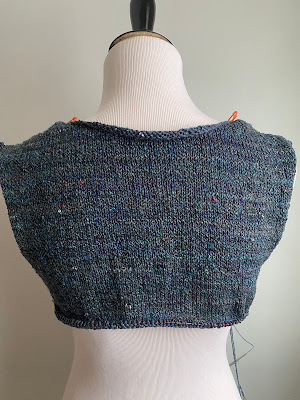Happy first Wednesday in February! Like many of you, I've been trying to avoid the news and instead focus on happy things, and joining Kat and the Unravelers is always one of the highlights of my week, so I'm all in on this update on my making and my reading.
But first I have to say a very heart-felt thank you for all the beautiful compliments you gave me on my sweater. I have worn it twice already this week, and I would not be surprised if I wear it at least once more. It is incredibly comfortable and warm without being stifling, so it's been great for this up-and-down weather we've been having.
There was so much of a focus on the sweater in my last post that I didn't mention that I also finished up a hat over the weekend:
Originally this was going to go in the charity pile, but then Molly tried it on after I finished it and it looked adorable on her, plus she gave me that look, so how could I say no? I did tell her that if I was going to give it to her, I expected her to wear it, and so far she's made good on her promise that she would. This is my Same as It Ever Was pattern (Ravelry link), which I recently published an update to that tells you how to work it at any gauge using any yarn. I've really been enjoying using fingering weight yarn and US 2.5/3.0 mm needles. For this particular one, I used Urban Girl Yarns Virginia Fingering, which comes in a very generous put-up of 480 yards per skein, in the colorway Duke of Hawtness (apparently it's a Bridgerton reference).
I seem to have gotten into a hat mood this week in general, because once those two projects were done, it's been all about hats.

It's the last week of the Pigskin Party, so I thought I'd try to sneak in a couple more projects to get some last-minute points. I'm using the Sagamore Flyover pattern, which calls for a bulky yarn, but instead I'm using fingering held triple. I think that's closer to Aran than bulky, but I'm knitting the largest size to make up for the difference. The bluish hat was knit with two strands of Bella Fio fingering that I won as a prize earlier in the Pigskin Party and one strand of LolaBean Yarn Co. fingering that was leftover from my Oh My Cod socks. The one in progress is using the rest of the skein of the Bella Fio yarn, leftovers of another LolaBean fingering that I used for a baby top last year, and leftover Geektastic Fibers (now Fandoms and Fibers) fingering from this cowl. These hats knit up really quickly but also use a lot of yarn -- that first one used 374 yards! These will be added to the charity pile for sure.
After having only one finished book to share last week, I've got four this week!
Bonny is responsible for putting
Small Rain on my radar, though since she mentioned it, I've heard about it other places as well. This is a fairly quiet but incredibly powerful book. The unnamed narrator (who shares many similarities with the author, though he has maintained this isn't a memoir) suffers a life-threatening medical emergency in the summer of 2020 and ends up in the ICU. He sees plenty of doctors and nurses but is allowed only one visitor per day for a limited amount of time, and thus he spends a lot of time alone, giving him ample opportunity to think and reflect on his life, his family, his relationships, and his place in the world. The uncertainty and confusion that many of us felt in the early days of the pandemic is amplified here, but so is the beauty that can be found in simple human kindness. It's hard to know how much of the book is truth (or at least modeled on truth) and how much is pure fiction, but regardless it's a beautiful and heartwarming work. I gave it 5 stars.

Next was my first audiobook in quite a while (I was way behind on podcasts because I usually listen to them and to books while I'm walking and running, and obviously I hadn't done that for several months). Typically the
Read With Us Zooms include an opportunity to make recommendations or talk about what we've read lately, and during the call last fall, someone recommended
Beautyland, which I recently found on audio on Hoopla. This is a quirky novel that follows Adina, who believes she is an alien sent to Earth to observe humans and report on them to her superiors, with whom she communicates via an old fax machine. Adina finds humans to be incredibly puzzling and spends many years trying to understand them through her observations. Is she actually an alien? I'm not sure, though I thought a lot of her difficulty in understanding human behavior and relationships could also said to be true of someone who was neurodivergent, so perhaps she's not actually an alien but feels like one. I thought it was charming and felt myself sympathizing with Adina frequently, even though I am definitely not an alien. I also got a kick out of the fact that at one point she is made fun of for mis-singing the chorus to
this song as "Simeon the whale" because not only is the song from a local band, but back when I was a tween going to summer camp, there was a staff member at my camp named Simeon and we deliberately sang the wrong lyrics to the song. I gave this book 4 stars.

Molly recently had to read
The Penelopiad for English class, so I borrowed her copy after she was finished because I'd long had it on my TBR list. It's a quick read, but it packs a punch. Penelope, wife of Odysseus, gets to tell her side of the story, from her youth and her love/hate relationship with her cousin Helen (yes, that Helen) to her marriage to her long wait for Odysseus's return from the Trojan War. In Margaret Atwood's hands, Penelope is anything but the patient, loyal wife; rather, she's a smart, cunning woman well aware of her place in the patriarchy who's not willing to sacrifice any more of her rights or herself than she needs to. She's critical of men -- rightfully so -- and gives a view of some of the famous names from
The Odyssey that suggests that their legacies might be different if a woman had been the one writing it. I gave it 4 stars.
Finally, I read
The Rachel Incident from my Kindle shelf. The Rachel of the title is the narrator, and the bulk of the book takes place a number of years earlier, during the economic downturn in Ireland, when Rachel is finishing up her college degree and working at a bookstore, where she meets James, who quickly becomes her flatmate and best friend. The two of them become involved (perhaps over-involved) with one of Rachel's professors and his wife. To say much more would give away a lot of the plot, so I'll leave it at that. I think what this book does well is capture that difficult period of the early 20s when "real life" is supposed to be starting but the situation isn't ideal -- when you've finished college but your degree feels useless because there are no jobs. I found a lot of the book to be a little on the bleak side, but it did wrap up rather nicely, and I gave it 4 stars.
I am currently reading
Boulder on the page and listening to
The Unseen World. It's good to be listening to books again!
What are you making and reading this week?




































